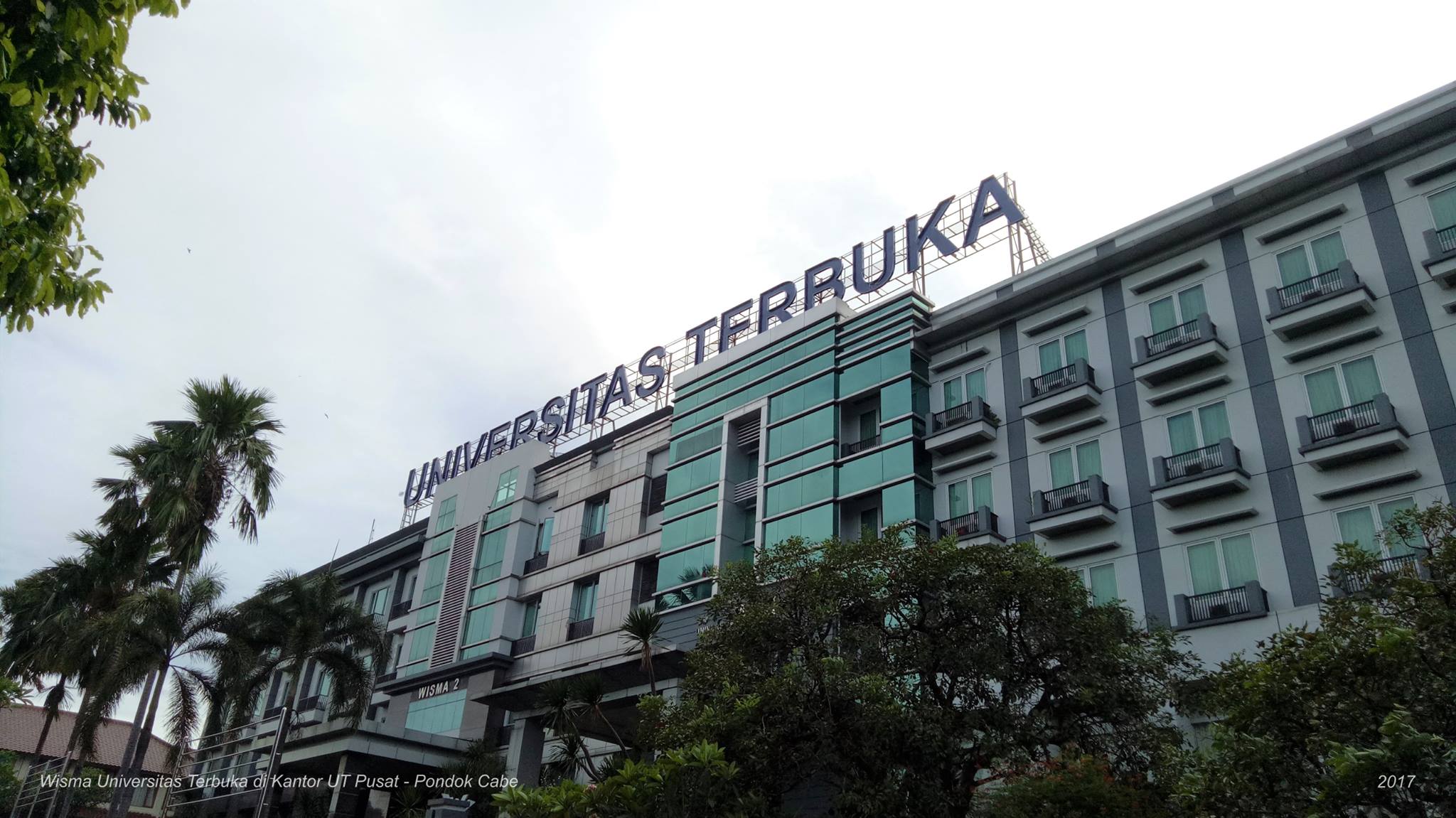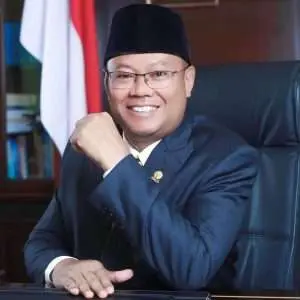

About UT
Universitas Terbuka (UT) is Indonesia state university that employs an Open and Distance Learning (ODL) system to widen access to higher education to all Indonesian citizens, including those who live in remote islands throughout the country, and in various parts of the world.
About UT
Universitas Terbuka (UT) is Indonesia state university that employs an Open and Distance Learning (ODL) system to widen access to higher education to all Indonesian citizens, including those who live in remote islands throughout the country, and in various parts of the world.

About UT

Universitas Terbuka (UT), established on September 4, 1984, is the 45th Indonesian state university. Its inception aimed to address two significant educational issues in Indonesia: the low quality of teachers and the limited capacity of higher education institutions. In response to these challenges, the then-president issued Presidential Decree No. 41 of 1984, laying the foundation for UT.
Inspired by the spirit of open and distance education, UT adopted the name “Universitas Terbuka,” reflecting its commitment to accessible and equitable higher education. The term “Terbuka” signifies the aspiration to “enlighten the nation,” as stated in the preamble of the 1945 Constitution of Indonesia. This philosophy emphasizes that education is a right for every citizen, unrestricted by age or learning duration—what we now refer to as the spirit of “lifelong learning.”
UT initially offered four undergraduate programs (S1): Public Administration, Business Administration, Economics and Development Studies, and Statistics. Additionally, it took over the educational responsibilities of the Distance Learning Teacher Education Project and the existing Akta V program.
Today, Universitas Terbuka offers 43 study programs, including 32 bachelor’s programs, 2 diploma programs, 7 master’s programs, and 2 doctoral programs. These programs fall under four faculties: Faculty of Teacher Education (FKIP), Faculty of Law, Social Sciences, and Political Sciences (FHISIP), Faculty of Economics and Business (FEB), and Faculty of Science and Technology (FST)1.
UT’s journey exemplifies its commitment to accessible education, bridging geographical gaps through distance learning, and empowering learners across Indonesia.
“To be a world-class open and distance higher education.”
Missions:
The main mission, mandated to UT through the Presidential Decree Number 41 of 1984, is that UT provides higher education programs easily accessible to the public. In line with the demands of the Tri Dharma of higher education and the development of the strategic environment, the formulation of UT’s missions is as follows.
- To increase the capacity of state universities;
- To increase equitable access to world-class higher education;
- To develop a culture of lifelong learning;
- To disseminate the results of scientific researches and distance education to support national and global development.
Chair: Prof. Ainun Na’im, M.B.A., Ph.D.
Secretary: Dr. Ake Wihadanto, S.E., M.T.
The Board of Trustees 2022-2027 in accordance with the Decree of the Minister of Education, Culture, Research, and Technology of the Republic of Indonesia Number 75343/MPK.A/KP.08.06/2022
- Minister of Education, Culture, Research, and Technology
- Rector of Universitas Terbuka
- Chair of Academic Senate of Universitas Terbuka
- Academic Senate Representatives
- Prof. Dr. Paulina Pannen, M.Ls. (Academic Senate representative)
- Prof. Dr. Sugilar, M.Pd. (Academic Senate representative)
- Prof. Dr. Ginta Ginting, M.B.A. (Academic Senate representative)
- Dr. Sri Listyarini, M.Ed. (Academic Senate representative)
- Dr. Sofjan Aripin, M.Si. (Academic Senate representative)
- Lecture Representatives (Non-senate Member)
- Prof. Dr. Sardjijo, M.Si.
- Dr. Ake Wihadanto, S.E., M.T.
- Ir. Anak Agung Made Sastrawan Putra, M.A., Ed.D.
- Community Representatives
- Prof. Ainun Na’im, Ph.D.
- Dr. (H.C) Dahlan Iskan
- Prof. Dr. Tjitjik Srie Tjahjandarie
- Drs. Muhammad Tair A, M.M. (Educational Staff Representative)
- Jenderal TNI (Purn) Dr. (H.C) Moeldoko, S.I.P., M.Si. (Alumni Representative)
- Alfiansyah Jauhari (Student Representative)
Duties and Authority of the Board of Trustees are:
- Approving the proposed changes to the University’s Statutes;
- Establishing university’s general non-academic policies;
- Establishing long-term development plans, strategic plans, and annual work and budget plans;
- Establishing university’s performance norms and benchmarks;
- Conducting an annual appraisal of the rector’s performance;
- Appointing and Dismissing the rector;
- Appointing and Dismissing the chair and members of the Audit Committee;
- Supervising and controlling over the non-academic management;
- Fostering networks with institutions and/or individuals outside the university;
- Providing consideration and supervision for developing and maintaining the university’s financial health;
- Making the key decision on issues that cannot be solved by the rector and/or academic senate;
- Preparing and submitting, together with the rector, an annual report to the minister.
Pertaining to the Rector’s Decree Number 6006/UN31/HK.02/2022 on the Appointment of the Chair and Secretary of the Academic Senate of Universitas Terbuka for the Term of Office 2022-2027, the organization structure of the Academic Senate is as follows:
Chair: Prof. Dr. Chanif Nurcholis, M.Si.
Secretary: Purwaningdyah Murti Wahyuni S.H., M.Hum.
Commission A on Education, Teaching, and Development of Science and/or Technology:
| Chair | : | Dr. Zainur Hidayah, S.Pi., M.M. |
| Secretary | : | Dr. Sri Tatminingsih, M.Pd. |
| Members | : | |
| 1. Dr. Mohamad Yunus, S.S., M.A. | ||
| 2. Prof. Daryono, S.H., M.A., Ph.D. | ||
| 3. Prof. Dr. Chanif Nurcholis, M.Si. | ||
| 4. Muhammad Husni Arifin, S.Ag., M.Si., Ph.D. | ||
| 5. Dr. Ernik Yuliana, S.Pi., M.T. |
Commission B on Academic Development, Planning, Budget, and Institutionalization:
| Chair | : | Dr. Hendrian, S.E., M.Si. |
| Secretary | : | Dr. Harmi Sugiarti, M.Si. |
| Members | : | |
| 1. Prof. Dr. Ali Muktiyanto, S.E., M.Si. | ||
| 2. Prof. Dr. Paulina Pannen, M.Ls. | ||
| 3. Dr. Meirani Harsasi, S.E., M.Si. | ||
| 4. Prof. Dr. Sugilar, M.Pd. | ||
| 5. Purwaningdyah Murti Wahyuni S.H., M.Hum. |
Commission C on Academic Appointments/Positions, Titles and Awards, and Academic Norms and/or Ethics Enforcement:
| Chair | : | Prof. Dr. Ginta Ginting, MBA |
| Secretary | : | Dr. Welli Yuliatmoko, S.TP., M.Si. |
| Members | : | |
| 1. Prof. Dr. Ucu Rahayu, M.Sc. | ||
| 2. Ir. Adi Winata, M.Si. | ||
| 3. Dr. Paken Pandiangan, S.Si., M.Si. | ||
| 4. Dr. Sofjan Aripin, M.Si. | ||
| 5. Dr. Yuni Tri Hewindati | ||
| 6. Rini Yayuk Priyati, S.E., M.Ec., Ph.D. |
Commission D on Strategic Studies, Partnership, Research, and Community Service:
| Chair | : | Dr. Sri Listyarini, M.Ed. |
| Secretary | : | Dr. Mery Noviyanti, S.Si., M.Pd. |
| Members | : | |
| 1. Prof. Drs. Ojat Darojat, M.Bus., Ph.D. | ||
| 2. Prof. Dra. Dewi Artati Padmo Putri, M.A., Ph.D. | ||
| 3. Dr. Sri Sediyaningsih, M.Si. | ||
| 4. Dr. Subekti Nurmawati, M.Si. | ||
| 5. Rahmat Budiman, S.S., M.Hum., Ph.D. | ||
| 6. Dr. Etty Puji Lestari, S.E., M.Si. |
The University Academic Senate has the function of establishing policy and providing academic consideration and supervision. The authority of the senate includes:
- Establishing academic policies regarding study program curricula; requirements for opening, changing, and closing study programs; requirements for awarding academic degrees; and requirements for awarding honorary doctorates and other academic awards;
- Establishing policies and supervising the implementation of academic freedom, academic pulpit freedom, and scientific autonomy;
- Establishing policies and overseeing the implementation of academic norms, ethics, and regulations;
- Recommending sanctions against violations of academic norms, ethics, and regulations committed by the academic community to the rector;
- Supervising the rector’s implementation of academic policies;
- Supervising and evaluating the achievement of academic performance;
- Giving approval to the rector in proposing associate professor and professor;
- Recommending the granting and or revocation of honorary doctorate degree;
- Giving approval for opening, changing, and closing study programs;
- Giving consideration for the establishment, merger, and/or dissolution of faculties, schools, and/or departments; and
- Preparing and approving, together with the Board of Trustees and the rector, the draft amendment to the University Statutes.
